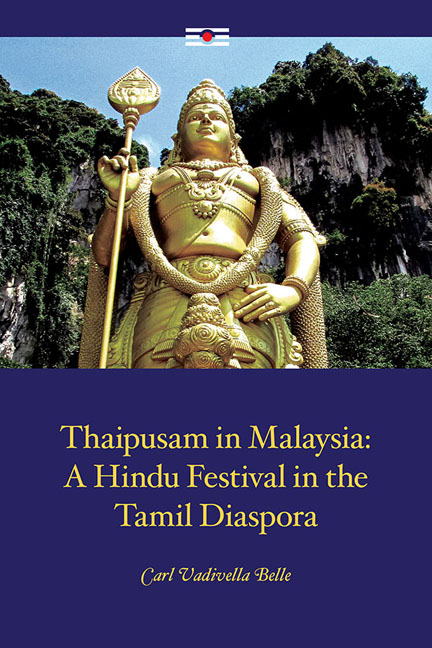Book contents
- Frontmatter
- Contents
- Acknowledgements
- Introduction
- 1 Indians in Malaysia: The Social and Ethnic Context
- 2 Tamil Traditions and South Indian Hinduism
- 3 Colonialism, Colonial Knowledge and Hindu Reform Movements
- 4 Hinduism in Malaysia: An Overview
- 5 Murugan: A Tamil Deity
- 6 The Phenomenology of Thaipusam at Batu Caves
- 7 Other Thaipusams
- 8 Thaipusam Considered: The Divine Crossing
- Conclusions
- Glossary
- Bibliography
- Index
- About the Author
8 - Thaipusam Considered: The Divine Crossing
Published online by Cambridge University Press: 12 January 2018
- Frontmatter
- Contents
- Acknowledgements
- Introduction
- 1 Indians in Malaysia: The Social and Ethnic Context
- 2 Tamil Traditions and South Indian Hinduism
- 3 Colonialism, Colonial Knowledge and Hindu Reform Movements
- 4 Hinduism in Malaysia: An Overview
- 5 Murugan: A Tamil Deity
- 6 The Phenomenology of Thaipusam at Batu Caves
- 7 Other Thaipusams
- 8 Thaipusam Considered: The Divine Crossing
- Conclusions
- Glossary
- Bibliography
- Index
- About the Author
Summary
This chapter will explore the kavadi ritual at Thaipusam through the structures of the Tamil Hindu pilgrimage ritual. This will examine theoretical notions of pilgrimage and the implications for the individual participant. The chapter will also investigate how Hindu ritual performs its work, and how it enables the devotee to affect a paradigm shift in the circumstances of his/her mundane existence through an appeal to and interaction with the Divine. This process involves substantial modification and transformation, which must be undertaken at a ritually propitious moment. At Thaipusam this follows the installation of the king-deity Murugan in his mountaintop palace, and his consequent readiness to grant audience to his devotees. The chapter looks at asceticism and change, the liminality of trance and its application as an agent of transformation at Thaipusam, and the multivalent symbology of the journey to the caves. Finally, this chapter makes reference to the Idumban puja, in which the devotee is restored to society, as well as the heat–colour paradigm.
At this juncture it may be germane to offer some basic observations regarding the role, function and potentially catalytic power of religious ritual. In the previous chapter we noted that ritual is the enactment of myth, in effect testing the validity and inner truth of that myth. The anthropologist Arnold van Gennep postulated that ritual fell into three distinct phases, namely:
A phase of separation in which the devotee withdraws from mundane routines into “sacred time” (that is, time outside the quotidian) and embarks upon a period of preparation for the main phase of the ritual.
A transformative phase in which the individual is in a state of “betwixt and between”. Victor Turner has famously described this phase as that of liminality, a period in which the receptive devotee, freed from the mundane, experiences new perceptions of reality and in which the mind will “proliferate new structures, new symbols, new metaphors”.
A reincorporative phase in which the individual, newly transmuted, is returned to quotidian routines.
- Type
- Chapter
- Information
- Thaipusam in MalaysiaA Hindu Festival in the Tamil Diaspora, pp. 288 - 353Publisher: ISEAS–Yusof Ishak InstitutePrint publication year: 2017



